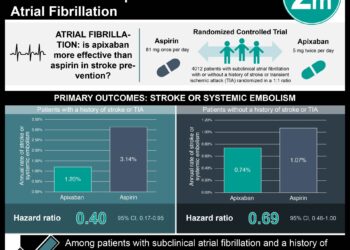Pre-operative aspirin not linked with improved outcomes during CABG
1. High-risk patients undergoing coronary artery bypass graft (CABG) surgery who were randomized to receive 100mg aspirin on the day of surgery did not experience lower rates of death or thrombotic complications within 30 days after surgery compared to those who received placebo.
2. Patients in the aspirin group did not experience higher rates of hemorrhagic complications compared to those who received placebo.
Evidence Rating Level: 1 (Excellent)
Study Rundown: There are conflicting data as to whether aspirin should be withheld in patients undergoing coronary artery surgery. In this multi-country randomized controlled study, patients were randomized to receive aspirin at a dose of 100mg or placebo on the day of coronary artery surgery. Generally speaking, patients were in their mid-60’s, predominantly male, and had a number of comorbidities that increased their risk of complications (e.g. diabetes, hypertension, heart failure, etc.). There was no significant difference in terms of a composite measure of death or thrombotic complications within 30 days after surgery; nor was there a significant difference in terms of incidence of hemorrhage or tamponade. These results were consistent across a number of pre-specified subgroup analyses. This trial adds substantially to the gap in data, suggesting that there is no appreciable benefit or drawback to continuing low-dose aspirin immediately prior to coronary artery surgery.
Click to read the study, published today in NEJM
Relevant Reading: Effect of preoperative aspirin use on mortality in coronary artery bypass grafting patients
In-Depth [randomized controlled trial]: This randomized, double-blind placebo-controlled study was conducted in five countries and involved 2100 patients (from 5784 eligible), 1047 who were randomized to receive 100mg aspirin on day of CABG, and 1053 to receive placebo. Patients were well balanced in terms of demographic variables as well as the nature of the surgery (median number of grafts was 3 in both groups). Half of the subjects in each group also received tranexamic acid. The primary outcome measure was a composite measure of death or thrombotic complications (nonfatal MI, stroke, PE, renal failure, or bowel infarction) within 30 days after surgery. This occurred in 19.3% of those in the aspirin group compared with 20.4% in the placebo group (RR with aspirin, 0.94; 95% [CI], 0.80 to 1.12; p=0.55). In terms of the primary outcome measure, there were no significant interactions between treatment group and sex, age, left ventricular function, surgical subtype, or recent exposure to aspirin. The occurrence of nonfatal MIs in both groups was higher than expected, which was attributed to the sensitive biomarker definitions that were employed by the authors. Major hemorrhage leading to reoperation occurred in 1.8% of the aspirin group and 2.1% of the placebo group (p=0.75), and cardiac tamponade in 1.1% and 0.4% respectively (p=0.08).
Image: PD
©2016 2 Minute Medicine, Inc. All rights reserved. No works may be reproduced without expressed written consent from 2 Minute Medicine, Inc. Inquire about licensing here. No article should be construed as medical advice and is not intended as such by the authors or by 2 Minute Medicine, Inc.







